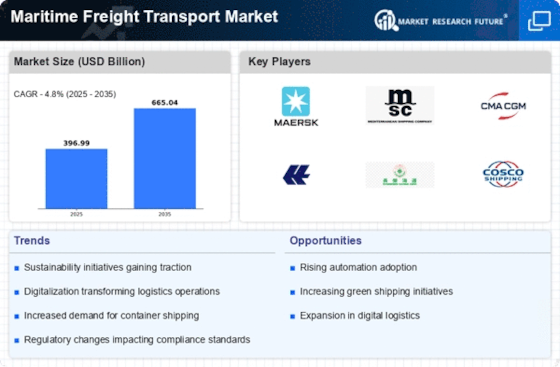Market Trends
Key Emerging Trends in the Maritime Freight Transport Market
The Maritime Freight Transport market is navigating through a sea of dynamic trends that are reshaping the industry and influencing its trajectory. One prominent trend is the increasing integration of digital technologies into maritime operations. From advanced vessel tracking systems to the utilization of blockchain for secure and transparent transactions, the industry is embracing digitalization to enhance efficiency, reduce costs, and improve overall supply chain visibility. These technological advancements are not only streamlining processes but also contributing to the development of smart ports and autonomous vessels, marking a significant shift towards a more digitally connected and automated maritime ecosystem.
Sustainability has emerged as a key focal point in the Maritime Freight Transport market. With growing environmental concerns, there is a concerted effort to adopt greener practices within the industry. This includes the development of eco-friendly vessels powered by alternative fuels, the implementation of energy-efficient technologies, and a commitment to reducing carbon emissions. The push towards sustainability is not only driven by regulatory pressures but also by a changing consumer landscape that values environmentally responsible transportation solutions. As a result, maritime stakeholders are increasingly investing in sustainable practices to meet both regulatory requirements and customer expectations.
Collaboration and partnerships are gaining prominence in the Maritime Freight Transport sector. Recognizing the complex nature of global supply chains, shipping companies, port operators, and logistics providers are forming strategic alliances to optimize routes, reduce transit times, and enhance overall operational efficiency. These collaborative efforts extend beyond traditional partnerships to include digital platforms that facilitate communication and coordination among various stakeholders. By fostering stronger collaboration, the industry is better positioned to address challenges such as congestion, delays, and disruptions, ensuring a more seamless flow of goods across international waters.
The impact of e-commerce on the Maritime Freight Transport market is unmistakable. The exponential growth of online retail has led to a surge in demand for efficient and reliable maritime shipping solutions. The industry is responding by adapting to the unique requirements of e-commerce, such as faster delivery times, real-time tracking, and increased flexibility. Container shipping, in particular, is playing a crucial role in supporting the global e-commerce supply chain, with containerization becoming a standard practice for the transportation of goods. As the e-commerce landscape continues to evolve, the Maritime Freight Transport market is poised to play a vital role in facilitating the movement of goods on a global scale.
Geopolitical factors are influencing market trends in Maritime Freight Transport. Trade tensions, political uncertainties, and changes in trade policies can significantly impact shipping routes, port operations, and shipping costs. Industry players are closely monitoring geopolitical developments and implementing strategies to mitigate risks associated with these uncertainties. Flexibility and adaptability are becoming crucial attributes for maritime stakeholders as they navigate the ever-changing geopolitical landscape, ensuring the resilience and continuity of global shipping operations.
Furthermore, the adoption of data analytics and artificial intelligence (AI) is transforming decision-making processes in the Maritime Freight Transport market. Predictive analytics is being employed to optimize routes, manage fuel consumption, and enhance overall operational efficiency. AI-powered technologies are also contributing to the development of predictive maintenance strategies, reducing downtime and ensuring the reliability of maritime vessels. As data becomes increasingly valuable in the industry, leveraging analytics and AI tools enables stakeholders to make informed decisions, optimize resource allocation, and enhance overall performance.


















Leave a Comment